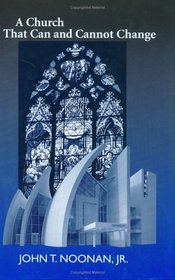Search -
A Church That Can And Cannot Change: The Development of Catholic Moral Teaching (Erasmus Institute Books)
A Church That Can And Cannot Change The Development of Catholic Moral Teaching - Erasmus Institute Books
Author:
By concrete examples, dated and put in context, John T. Noonan, Jr., demonstrates how the moral teaching of the Catholic Church has changed and is changing without abandoning its foundational commitment to the Gospel of Jesus Christ. From St. Paul's return of a runaway slave to his master, to John Henry Newman's startle at the idea that slavery... more »
Author:
By concrete examples, dated and put in context, John T. Noonan, Jr., demonstrates how the moral teaching of the Catholic Church has changed and is changing without abandoning its foundational commitment to the Gospel of Jesus Christ. From St. Paul's return of a runaway slave to his master, to John Henry Newman's startle at the idea that slavery... more »
ISBN-13: 9780268036034
ISBN-10: 0268036039
Publication Date: 1/15/2005
Pages: 280
Rating: ?
ISBN-10: 0268036039
Publication Date: 1/15/2005
Pages: 280
Rating: ?
0 stars, based on 0 rating
Publisher: University of Notre Dame Press
Book Type: Hardcover
Members Wishing: 1
Reviews: Amazon | Write a Review
Book Type: Hardcover
Members Wishing: 1
Reviews: Amazon | Write a Review
Genres:
- Christian Books & Bibles >> Catholicism >> General
- Christian Books & Bibles >> Christian Living >> Relationships >> Divorce
- Christian Books & Bibles >> Church History >> Catholic




